

Homepage - Bayer. Wageningen UR - Wageningen University. Peterverhaar: #zembla ik hoor Bleker hier... Peterverhaar: En even voor de duidelijkh... Dr. T Blacquiere , Tjeerd. Neonicotinen en bijensterfte, oorzaak en gevolg? (not peer reviewed?) Tjeerd Blacquière De sterfte van bijenvolken houdt de gemoederen al een paar jaar bezig, en een veelheid aan verklaringen wordt aangevoerd.
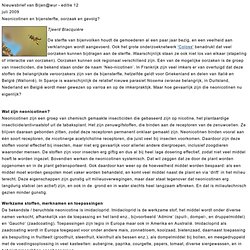
Tennekes: Bird decline, insect decline and neonicotinoids. De Wageningse bijenexpert dr.
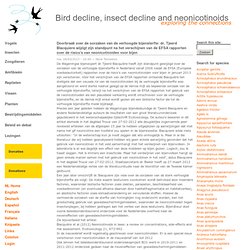
Wageningen UR - Unifarm. WageningenUR PRI: Plant Research Intern: PRI ~ Bayer BioScience. NYTimes: Honeybee Killer Found by Army and Entomologists. BASF Global - BASF - The Chemical Company - Corporate Website. Trouw: 'Wageningen' geeft onafhank elijkheid weg aan industrie - Nederland. Imidacloprid. Imidacloprid is currently the most widely used insecticide in the world.[3] Although it is now off patent, the primary manufacturer of this chemical is Bayer CropScience (part of Bayer AG).
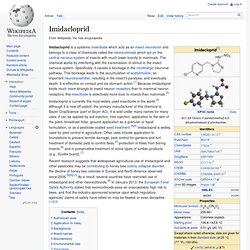
It is sold under many names for many uses; it can be applied by soil injection, tree injection, application to the skin of the plant, broadcast foliar, ground application as a granular or liquid formulation, or as a pesticide-coated seed treatment.[4][5] Imidacloprid is widely used for pest control in agriculture. Other uses include application to foundations to prevent termite damage, pest control for gardens and turf, treatment of domestic pets to control fleas,[2] protection of trees from boring insects,[6] and in preservative treatment of some types of lumber products (e.g., Ecolife brand).[7] Authorized uses[edit] Imidacloprid is the most widely used insecticide in the world. Its major uses include: Application to trees[edit] Background[edit] On March 25, 1992, Miles, Inc.
Brand names[edit] CropScience - Main Locations. Our global presence and cultural diversity are key conditions for our success as a world market leader in our industry.

As a result, we know the needs of our customers in both small, specific segments and the major global markets. Our organization bases its decisions closely on the market and features a customer-oriented alignment. Bayer CropScience also maintains a global network of research & development and production sites. Monheim am Rhein , bayer cropscience. Bayer CropScience - NL - Home. CNNMoney: What a scientist didn't tell the NY Times on honeybee deaths - Oct. 8, 2010. Jerry Bromenshenk, bee investigatorBy Katherine Eban, contributorOctober 8, 2010: 1:42 PM ET FORTUNE -- Few ecological disasters have been as confounding as the massive and devastating die-off of the world's honeybees.
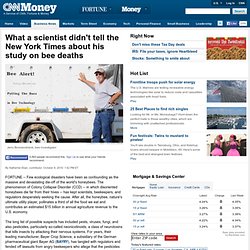
The phenomenon of Colony Collapse Disorder (CCD) -- in which disoriented honeybees die far from their hives -- has kept scientists, beekeepers, and regulators desperately seeking the cause. After all, the honeybee, nature's ultimate utility player, pollinates a third of all the food we eat and contributes an estimated $15 billion in annual agriculture revenue to the U.S. economy. Honeybee researcher who blames virus for CCD has financial ties to pesticide manufacturer. (NaturalNews) The New York Times recently published a story on a new report that claims to have discovered one of the primary causes of colony collapse disorder (CCD), a condition in which entire colonies of bees mysteriously die.
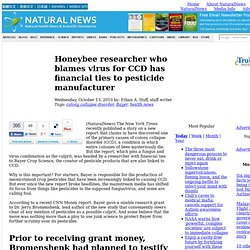
Bee Care. Bayer (BayerBeeCare) sur Twitter. A new way of protecting bees against varroa mites. Western honey bees are in danger: American and European beekeepers have been reporting massive bee losses for several years.
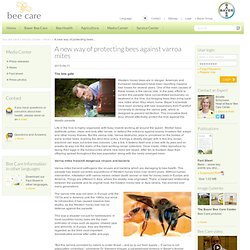
One of the main causes of these losses is the varroa mite. In the past, efforts to control this parasite have concentrated exclusively on treatment in the hive, but foraging bees then bring back new mites when they return home. Bayer’s scientists have been working with bee researchers from Frankfurt University to develop the varroa gate, which is designed to prevent reinfection. This innovative front door should effectively protect the hive against the deadly parasite. Bayer - Bee Care Tour. Bayer CropScience fosters collaboration and understanding of bee health by launching Midwestern tour at Ag Issues Forum and Commodity Classic Orlando, Fla.
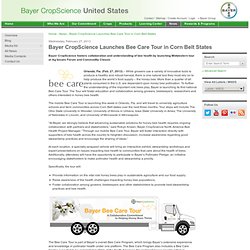
(Feb. 27, 2013) – While growers use a variety of innovative tools to produce a healthy and robust harvest, there is one natural tool they must rely on to help produce the world’s food supply – the honey bee. More than a quarter of all plants consumed in the U.S. are dependent upon honey bee pollination. To further the understanding of the important role bees play, Bayer is launching its first national Bee Care Tour. The Tour will foster education and collaboration among growers, beekeepers, researchers and others interested in honey bee health. The mobile Bee Care Tour is launching this week in Orlando, Fla. and will travel to university agriculture schools and farm communities across Corn Belt states over the next three months. FreezePage. Collaboration: The Best Approach to Bee Health.
Bayer CropScience Bee Care Tour Stops in Illinois. URBANA, Ill.
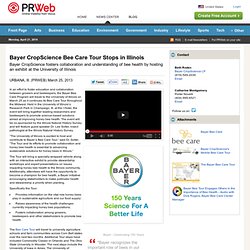
(PRWEB) March 25, 2013 In an effort to foster education and collaboration between growers and beekeepers, the Bayer Bee Care Program will travel to the University of Illinois on March 25 as it continues its Bee Care Tour throughout the Midwest. Held in the University of Illinois’s Research Park in Champaign, Ill. at the I Hotel, the event will bring together leading researchers and beekeepers to promote science-based solutions aimed at improving honey bee health. The event will be co-sponsored by the Illinois Natural History Survey and will feature guest speaker Dr. Lee Solter, insect pathologist at the Illinois Natural History Survey. “The University of Illinois is excited to host and contribute to Bayer’s Bee Care Tour,” said Dr. The Tour will bring a specially-wrapped vehicle along with an interactive exhibit to provide stewardship workshops and expert presentations on issues impacting honey bee health to the Illinois community.
Research Triangle Park, NC.